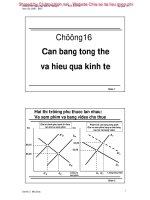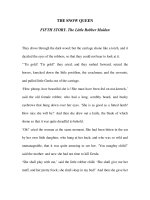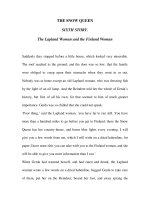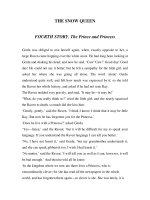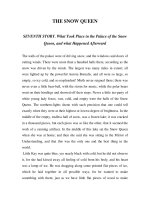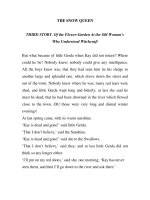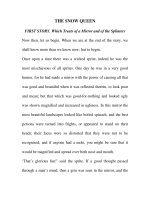The midnight queen
Bạn đang xem bản rút gọn của tài liệu. Xem và tải ngay bản đầy đủ của tài liệu tại đây (944.04 KB, 216 trang )
TheProjectGutenbergEBookofTheMidnightQueen,byMayAgnesFleming
ThiseBookisfortheuseofanyoneanywhereatnocostandwith
almostnorestrictionswhatsoever.Youmaycopyit,giveitawayor
re-useitunderthetermsoftheProjectGutenbergLicenseincluded
withthiseBookoronlineatwww.gutenberg.org
Title:TheMidnightQueen
Author:MayAgnesFleming
ReleaseDate:December25,2008[EBook#2950]
LastUpdated:March15,2018
Language:English
***STARTOFTHISPROJECTGUTENBERGEBOOKTHEMIDNIGHTQUEEN***
ProducedbyAnAnonymousProjectGutenbergVolunteer,andDavidWidger
THEMIDNIGHTQUEEN
ByMayAgnesFleming
CONTENTS
THEMIDNIGHTQUEEN
CHAPTERI.THESORCERESS.
CHAPTERII.THEDEADBRIDE.
CHAPTERIII.THECOURTPAGE.
CHAPTERIV.THESTRANGER.
CHAPTERV.THEDWARFANDTHERUIN.
CHAPTERVI.LAMASQUE.
CHAPTERVII.THEEARL'SBARGE.
CHAPTERVIII.THEMIDNIGHTQUEEN.
CHAPTERIX.LEOLINE.
CHAPTERX.THEPAGE,THEFIRES,ANDTHEFALL.
CHAPTERXI.THEEXECUTION.
CHAPTERXII.DOOM.
CHAPTERXIII.ESCAPED.
CHAPTER,XIV.INTHEDUNGEON.
CHAPTERXV.LEOLINE'SVISITORS.
CHAPTERXVI.THETHIRDVISION.
CHAPTERXVII.THEHIDDENFACE
CHAPTERXVIII.THEINTERVIEW.
CHAPTERXIX.HUBERT'SWHISPER.
CHAPTERXX.ATTHEPLAGUE-PIT.
CHAPTER,XXI.WHATWASBEHINDTHEMASK.
CHAPTERXXII.DAY-DAWN.
CHAPTERXXIII.FINIS.
THEMIDNIGHTQUEEN,
CHAPTERI.THESORCERESS.
TheplagueragedinthecityofLondon.Thedestroyingangelhadgoneforth,
andkindled with itsfierybreaththeawfulpestilence,untilallLondonbecame
one mighty lazar-house. Thousands were swept away daily; grass grew in the
streets, and the living were scarce able to bury the dead. Business of all kinds
was at an end, except that of the coffin-makers and drivers of the pest-cart.
Whole streets were shut up, and almost every other house in the city bore the
fatal red cross, and the ominous inscription, “Lord have mercy on us”. Few
people,savethewatchmen,armedwithhalberts,keepingguardoverthestricken
houses,appearedinthestreets;andthosewhoventuredthere,shrankfromeach
other, and passed rapidly on with averted faces. Many even fell dead on the
sidewalk,andlaywiththeirghastly,discoloredfaces,upturnedtothemocking
sunlight,untilthedead-cartcamerattlingalong,andthedrivershoistedthebody
withtheirpitchforksonthetopoftheirdreadfulload.Fewothervehiclesbesides
thosesamedead-cartsappearedinthecitynow;andtheypliedtheirtradebusily,
dayandnight;andthecry ofthedriversechoeddismallythroughthedeserted
streets: “Bring out your dead! bring out your dead!” All who could do so had
longagofledfromthedevotedcity;andLondonlayundertheburningheatof
theJunesunshine,strickenforitssinsbythehandofGod.Thepest-houseswere
full,soweretheplague-pits,wherethedeadwerehurledincartfuls;andnoone
knewwhoroseupinhealthinthemorningbutthattheymightbelyingstarkand
deadinafewhours.Theverychurcheswereforsaken;theirpastorsfledorlying
intheplague-pits;anditwasevenresolvedtoconvertthegreatcathedralofSt.
Paulintoavastplague-hospital.Criesandlamentationsechoedfromoneendof
thecitytotheother,andDeathandCharlesreignedoverLondontogether.
Yet in the midst of all this, many scenes of wild orgies and debauchery still
wentonwithinitsgates—as,inourownday,whenthecholeraravagedParis,the
inhabitants of that facetious city made it a carnival, so now, in London, they
weremanywho,feelingtheyhadbutafewdaystoliveatthemost,resolvedto
defydeath,andindulgeintherevelrywhiletheyyetexisted.“Eat,drink,andbe
merry,forto-morrowyoudie!”wastheirmotto;andifinthemidstofthefrantic
dance or debauched revel one of them dropped dead, the others only shrieked
with laughter, hurled the livid body out to the street, and the demoniac mirth
grew twice as fast and furious as before. Robbers and cut-purses paraded the
streetsatnoonday,enteredboldlyclosedanddesertedhouses,andboreoffwith
impunity,whatevertheypleased.HighwaymeninfestedHounslowHeath,andall
theroadsleadingfromthecity,levyingatollonallwhopassed,andplundering
fearlessly the flying citizens. In fact, far-famed London town, in the year of
grace1665,wouldhavegivenoneagoodideaofPandemoniumbrokeloose.
ItwasdrawingtothecloseofanalmosttropicalJuneday,thatthecrowdwho
hadthrongedtheprecinctsofSt.Paul'ssinceearlymorning,begantodisperse.
Thesun,thathadthrobbedthelivelongdaylikeagreatheartoffireinaseaof
brass,wassinkingfromsightincloudsofcrimson,purpleandgold,yetPaul's
Walk was crowded. There were court-gallants in ruffles and plumes; balladsingers chanting the not over-delicate ditties of the Earl of Rochester; usurers
exchanging gold for bonds worth three times what they gave for them; quackdoctorsreadingindoloroustonesthebillsofmortalityoftheprecedingday,and
selling plague-waters and anti-pestilential abominations, whose merit they
loudly extolled; ladies too, richly dressed, and many of them masked; and
booksellers who always made St. Paul's a favorite haunt, and even to this day
patronizeitsprecincts, andflourishintheregionsof Paternoster Rowand Ave
Maria Lane; court pages in rich liveries, pert and flippant; serving-men out of
place, and pickpockets with a keen eye to business; all clashed and jostled
together,raisingadintowhichthePlainofShinar,withitsconfusionoftongues
andBabylonishworkmen,wereasnothing.
Moving serenely through this discordant sea of his fellow-creatures came a
young man booted and spurred, whose rich doublet of cherry colored velvet,
edgedandspangledwithgold,andjauntyhatsetslightlyononesideofhishead,
withitslongblackplumeanddiamondclasp,proclaimedhimtobesomebody.A
profusion of snowy shirt-frill rushed impetuously out of his doublet; a blackvelvet cloak, lined with amber-satin, fell picturesquely from his shoulders; a
swordwithajeweledhiltclankedonthepavementashewalked.Onehandwas
coveredwithagauntletofcanary-coloredkid,perfumedtoadegreethatwould
shame any belle of to-day, the other, which rested lightly on his sword-hilt,
flashedwithasplendidopal,splendidlyset.Hewasahandsomefellowtoo,with
fair waving hair (for he had the good taste to discard the ugly wigs then in
vogue), dark, bright, handsome eyes, a thick blonde moustache, a tall and
remarkably graceful figure, and an expression of countenance wherein easy
good-natureandfieryimpetuosityhadahardstruggleformastery.Thathewasa
courtierofrank,wasapparentfromhisrichattireandratheraristocraticbearing
and a crowd of hangers-on followed him as he went, loudly demanding spurmoney. A group of timbril-girls, singing shrilly the songs of the day, called
boldlytohimashepassed;andoneofthem,morefreeandeasythantherest,
danced up to him striking her timbrel, and shouting rather than singing the
chorusofthethenpopularditty,
“WhatcareIforpestorplague?
Wecandiebutonce,Godwot,
Kissmedarling—staywithme:
Loveme—loveme,leavemenot!”
The darling in question turned his bright blue eyes on that dashing streetsingerwithacoolglanceofrecognition.
“Verysorry,Nell,”hesaid,inanonchalanttone,“butI'mafraidImust.How
longhaveyoubeenhere,mayIask?”
“A full hour by St. Paul's; and where has Sir Norman Kingsley been, may I
ask?Ithoughtyouweredeadoftheplague.”
“Notexactly.Haveyouseen—ah!thereheis.TheverymanIwant.”
WithwhichSirNormanKingsleydroppedagoldpieceintothegirl'sextended
palm,andpushedonthroughthecrowdupPaul'sWalk.Atall,darkfigurewas
leaningmoodilywithfoldedarms,lookingfixedlyattheground,andtakingno
notice of the busy scene around him until Sir Norman laid his ungloved and
jeweledhandlightlyonhisshoulder.
“Good morning, Ormiston. I had an idea I would find you here, and—but
what's the matter with you, man? Have you got the plague? or has your
mysteriousinamoratajiltedyou?orwhatotherannoyancehashappenedtomake
youlookaswoebegoneasoldKingLear,sentadriftbyhistenderdaughtersto
takecareofhimself?”
The individual addressed lifted his head, disclosing a dark and rather
handsomeface,settlednowintoalookofgloomydiscontent.Heslightlyraised
hishatashesawwhohisquestionerwas.
“Ah!it'syou,SirNorman!Ihadgivenupallnotionofyourcoming,andwas
abouttoquitthisconfoundedbabel—thistumultuousdenofthieves.Whathas
detainedyou?”
“IwasondutyatWhitehall.Arewenotintimetokeepourappointment?”
“Oh,certainly!LaMasqueisathometovisitorsatallhours,dayandnight.I
believeinmysoulshedoesn'tknowwhatsleepmeans.”
“Andyouarestillasmuchinlovewithherasever,Idareswear!Ihaveno
doubt,now,itwasofheryouwerethinkingwhenIcameup.Nothingelsecould
everhavemadeyoulooksodismallywoebegoneasyoudid,whenProvidence
sentmetoyourrelief.”
“I was thinking of her,” said the young man moodily, and with a darkening
brow.
Sir Norman favored him with a half-amused, half-contemptuous stare for a
moment; then stopped at a huckster's stall to purchase some cigarettes; lit one,
andaftersmokingforafewminutes,pleasantlyremarked,asifthefacthadjust
struckhim:
“Ormiston,you'reafool!”
“Iknowit!”saidOrmiston,sententiously.
“The idea,” said Sir Norman, knocking the ashes daintily off the end of his
cigarwiththetipofhislittlefinger—“theideaoffallinginlovewithawoman
whosefaceyouhaveneverseen!Icanunderstandamanagoingtoanyabsurd
extreme when he falls in love in proper Christian fashion, with a proper
Christianface;buttogostark,staringmad,asyouhavedone,mydearfellow,
aboutablackloomask,why—Iconsiderthatalittletoomuchofagoodthing!
Come,letusgo.”
Nodding easily to his numerous acquaintances as he went, Sir Norman
KingsleysaunteredleisurelydownPaul'sWalk,andoutthroughthegreatdoorof
thecathedral,followedbyhismelancholyfriend.Pausingforamomenttogaze
atthegorgeoussunsetwithalookoflanguidadmiration,SirNormanpassedhis
armthroughthatofhisfriend,andtheywalkedonatratherarapidpace,inthe
direction of old London Bridge. There were few people abroad, except the
watchmenwalkingslowlyupanddownbeforetheplague-strickenhouses;butin
every street they passed through they noticed huge piles of wood and coal
heapeddownthecentre.Smokingzealouslytheyhadwalkedonforaseasonin
silence,whenOrmistonceasedpuffingforamoment,toinquire:
“Whatareallthesefor?Thisisastrangetime,Ishouldimagine,forbonfires.”
“They're not bonfires,” said Sir Norman; “at least they are not intended for
that; and if your head was not fuller of that masked Witch of Endor than
commonsense(forIbelievesheisnothingbetterthanawitch),youcouldnot
have helpedknowing.TheLordMayor ofLondonhasbeeninspiredsuddenly,
withanotion,thatifseveralthousandfiresarekindledatonceinthestreets,it
willpurifytheair,andcheckthepestilence;sowhenSt.Paul'stollsthehourof
midnight, all these piles are to be fired. It will be a glorious illumination, no
doubt; but as to its stopping the progress of the plague, I am afraid that it is
altogethertoogoodtobetrue.”
“Whyshouldyoudoubtit?Theplaguecannotlastforever.”
“No.ButLilly,theastrologer,whopredicteditscoming,alsoforetoldthatit
wouldlastformanymonthsyet;andsinceoneprophecyhascometrue,Iseeno
reasonwhytheothershouldnot.”
“Except the simple one that there would be nobody left alive to take it. All
Londonwillbelyingintheplague-pitsbythattime.”
“A pleasant prospect; but a true one, I have no doubt. And, as I have no
ambition to be hurled headlong into one of those horrible holes, I shall leave
townaltogetherinafewdays.And,Ormiston,Iwouldstronglyrecommendyou
tofollowmyexample.”
“Not I!” said Ormiston, in a tone of gloomy resolution. “While La Masque
stays,sowillI.”
“Andperhapsdieoftheplagueinaweek.”
“So be it! I don't fear the plague half as much as I do the thought of losing
her!”
AgainSirNormanstared.
“Oh, I see! It's a hopeless case! Faith, I begin to feel curious to see this
enchantress,whohasmanagedsoeffectuallytoturnyourbrain.Whendidyou
seeherlast?”
“Yesterday,” said Ormiston, with a deep sigh. “And if she were made of
granite,shecouldnotbehardertomethansheis!”
“Soshedoesn'tcareaboutyou,then?”
“Not she! She has a little Blenheim lapdog, that she loves a thousand times
morethansheeverwillme!”
“Thenwhatanidiotyouare,tokeephauntingherlikehershadow!Whydon't
youbeaman,andtearoutfromyourheartsuchagoddess?”
“Ah!that'seasilysaid;butifyouwereinmyplace,you'dactexactlyasIdo.”
“Idon'tbelieveit.It'snotinmetogomadaboutanythingwithamaskedface
andamarbleheart.IfIlovedanywoman—which,thankFortune!atthispresent
timeIdonot—andshehadthebadtastenottoreturnit,Ishouldtakemyhat,
make her a bow, and go directly and love somebody else made of flesh and
blood,insteadofcastiron!Youknowtheoldsong,Ormiston:
'Ifshebenotfairforme
WhatcareIhowfairshebe!'”
“Kingsley,youknownothingaboutit!”saidOrmiston,impatiently.“Sostop
talkingnonsense.Ifyouarecold-blooded,Iamnot;and—Iloveher!”
Sir Norman slightly shrugged his shoulders, and flung his smoked-out weed
intoaheapoffire-wood.
“Arewenearherhouse?”heasked.“Yonderisthebridge.”
“And yonder is the house,” replied Ormiston, pointing to a large ancient
building—ancientevenforthosetimes—withthreestories,eachprojectingover
theother.“See!whilethehousesoneithersidearemarkedaspest-stricken,hers
alonebearsnocross.Soitis:thosewhoclingtolifearestrickenwithdeath:and
thosewho,likeme,aredesperate,evendeathshuns.”
“Why, my dear Ormiston, you surely are not so far gone as that? Upon my
honor,Ihadnoideayouwereinsuchabadway.”
“Iamnothingbutamiserablewretch!andIwishtoHeavenIwasinyonder
dead-cart,withtherestofthem—andshe,too,ifsheneverintendstoloveme!”
Ormiston spoke with such fierce earnestness, that there was no doubting his
sincerity;andSirNormanbecameprofoundlyshocked—somuchso,thathedid
not speak again until they were almost at the door. Then he opened his lips to
ask,inasubduedtone:
“Shehaspredictedthefutureforyou—whatdidsheforetell?”
“Nothinggood;nofearoftherebeinganythinginstoreforsuchanunlucky
dogasIam.”
“Wheredidshelearnthiswonderfulblackartofhers?”
“In the East, I believe. She has been there and all over the world; and now
visitsEnglandforthefirsttime.”
“She has chosen a sprightly season for her visit. Is she not afraid of the
plague,Iwonder?”
“No;shefearsnothing,”saidOrmiston,asheknockedloudlyatthedoor.“I
begintobelievesheismadeofadamantinsteadofwhatotherwomenaremade
of.”
“Which is a rib, I believe,” observed Sir Norman, thoughtfully. “And that
accounts,Idaresay,fortheirbeingofsuchacrookedandcantankerousnature.
They're a wonderful race women are; and for what Inscrutable reason it has
pleasedProvidencetocreatethem—”
The opening of the door brought to a sudden end this little touch of
moralizing, and a wrinkled old porter thrust out a very withered and unlovely
face.
“LaMasqueathome?”inquiredOrmiston,steppingin,withoutceremony.
Theoldmannodded,andpointedupstairs;andwitha“Thisway,Kingsley,”
Ormiston sprang lightly up, three at a time, followed in the same style by Sir
Norman.
“You seem pretty well acquainted with the latitude and longitude of this
place,”observedthatyounggentleman,astheypassedintoaroomattheheadof
thestairs.
“I ought to be; I've been here often enough,” said Ormiston. “This is the
commonwaiting-roomforallwhowishtoconsultLaMasque.Thatoldbagof
boneswholetusinhasgonetoannounceus.”
Sir Norman took a seat, and glanced curiously round the room. It was a
common-placeapartmentenough,withafloorofpolishedblackoak,slipperyas
ice, and shining like glass; a few old Flemish paintings on the walls; a large,
round table in the centre of the floor, on which lay a pair of the old musical
instruments called “virginals.” Two large, curtainless windows, with minute
diamond-shaped panes, set in leaden casements, admitted the golden and
crimsonlight.
“Forthereception-roomofasorceress,”remarkedSirNorman,withanairof
disappointedcriticism,“thereisnothingverywonderfulaboutallthis.Howisit
shespaesfortunesanyway?AsLillydoesbymapsandcharts;orastheseold
Easternmuftidoitbymagicmirrorsandalleachfooleries?”
“Neither,”saidOrmiston,“herstyleinmorelikethatoftheIndianalmechs,
whoshowyouyourdestinyinawell.Shehasasortofmagiclakeinherroom,
and—butyouwillseeitallforyourselfpresently.”
“I have always heard,” said Sir Norman, in the same meditative way, “that
truthliesatthebottomofawell,andIamgladsomeonehasturnedupatlast
whoisabletofishitout.Ah!HerecomesourancientMercurytoshowustothe
presenceofyourgoddess.”
Thedooropened,andthe“oldbagofbones,”asOrmistonirreverentlystyled
his lady-love's ancient domestic, made a sign for them to follow him. Leading
thewaydownalongacorridor,heflungopenapairofshiningfolding-doorsat
theend,andusheredthematonceintothemajesticpresenceofthesorceressand
her magic room. Both gentlemen doffed their plumed hats. Ormiston stepped
forward at once; but Sir Norman discreetly paused in the doorway to
contemplatethesceneofaction.Asheslowlydidso,alookofdeepdispleasure
settledonhisfeatures,onfindingitnothalfsoawfulashehadsupposed.
In some ways it was very like the room they had left, being low, large, and
square,andhavingfloors,wallsandceilingpaneledwithglossyblackoak.Butit
hadnowindows—alargebronzelamp,suspendedfromthecentreoftheceiling,
shedaflickering,ghostlylight.Therewerenopaintings—somegrimcarvingsof
skulls, skeletons, and serpents, pleasantly wreathed the room—neither were
thereseatsnortables—nothingbutahugeebonycaldronattheupperendofthe
apartment,overwhichagrinningskeletononwires,withascytheinonehandof
bone, and an hour-glass in the other, kept watch and ward. Opposite this
cheerful-lookingguardian,wasatallfigureinblack,standinganmotionlessasif
it,too,wascarvedinebony.Itwasafemalefigure,verytallandslight,butas
beautifullysymmetricalasaVenusCelestis.Herdresswasofblackvelvet,that
sweptthepolishedfloor,spangledalloverwithstarsofgoldandrichrubies.A
profusionofshiningblackhairfellinwavesandcurlsalmosttoherfeet;buther
face,fromforeheadtochin,wascompletelyhiddenbyablackvelvetmask.In
onehand,exquisitelysmallandwhite,sheheldagoldcasket,blazing(likeher
dress) with rubies, and with the other she toyed with a tame viper, that had
twined itself round her wrist. This was doubtless La Masque, and becoming
consciousofthatfactSirNormanmadeheralowandcourtlybow.Shereturned
itbyaslightbendofthehead,andturningtowardhiscompanion,spoke:
“Youhere,again,Mr.Ormiston!TowhatamIindebtedforthehonoroftwo
visitsintwodays?”
Hervoice,SirNormanthought,wasthesweetesthehadeverheard,musical
asachimeofsilverbells,softasthetonesofanaeolianharpthroughwhichthe
westwindplays.
“Madam,Iamawaremyvisitsareundesired,”saidOrmiston,withaflushing
cheekand,slightlytremulousvoice;“butIhavemerelycomewithmyfriend,Sir
NormanKingsley,whowishestoknowwhatthefuturehasinstoreforhim.”
Thusinvoked,SirNormanKingsleysteppedforwardwithanotherlowbowto
themaskedlady.
“Yes, madam, I have long heard that those fair fingers can withdraw the
curtainofthefuture,andIhavecometoseewhatDameDestinyisgoingtodo
forme.”
“SirNormanKingsleyiswelcome,”saidthesweetvoice,“andshallseewhat
hedesires.Thereisbutonecondition,thathewillkeepperfectlysilent;forifhe
speaks,thescenehebeholdswillvanish.Comeforward!”
SirNormancompressedhislipsascloselyasiftheywereforeverhermetically
sealed, and came forward accordingly. Leaning over the edge of the ebony
caldron, he found that it contained nothing more dreadful than water, for he
labored under a vague and unpleasant idea that, like the witches' caldron in
Macbeth,itmightbefilledwithserpents'bloodandchildrens'brains.LaMasque
openedhergoldencasket,andtookfromitaportionofredpowder,withwhich
itwasfilled.Castingitintothecaldron,shemurmuredaninvocationinSanscrit,
orCoptic,orsomeotherunknowntongue,andslowlytherearoseadensecloud
of dark-red smoke, that nearly filled the room. Had Sir Norman ever read the
story of Aladdin, he would probably have thought of it then; but the young
courtierdidnotgreatlyaffectliteratureofanykind,andthoughtofnothingnow
but of seeing something when the smoke cleared away. It was rather long in
doingso,andwhenitdid,hesawnothingatfirstbuthisownhandsome,halfserious,half-incredulousface;butgraduallyapicture,distinctandclear,formed
itselfatthebottom,andSirNormangazedwithbewilderedeyes.Hesawalarge
roomfilledwithasparklingcrowd,manyofthemladies,splendidlyarrayedand
flashinginjewels,andforemostamongthemstoodonewhosebeautysurpassed
anythinghehadeverbeforedreamedof.Sheworetherobesofaqueen,purple
and ermine—diamonds blazed on the beautiful neck, arms, and fingers, and a
tiara of the same brilliants crowned her regal head. In one hand she held a
sceptre;whatseemedtobeathronewasbehindher,butsomethingthatsurprised
SirNortonmostofallwas,tofindhimselfstandingbesideher,thecynosureof
alleyes.Whileheyetgazedinmingledastonishmentandincredulity,thescene
faded away, and another took its place. This time a dungeon-cell, damp and
dismal; walls, and floor, and ceiling covered with green and hideous slime. A
smalllampstoodonthefloor,andby itssickly,watery gleam,he sawhimself
againstanding,paleanddejected,nearthewall.Buthewasnotalone;thesame
glitteringvisioninpurpleanddiamondsstoodbeforehim,andsuddenlyhedrew
hisswordandplungedituptothehiltinherheart!Thebeautifulvisionfelllike
astoneathisfeet,andtheswordwasdrawnoutreekingwithherlife-blood.This
was a little too much for the real Sir Norman, and with an expression of
indignant consternation, he sprang upright. Instantly it all faded away and the
reflectionofhisownexcitedfacelookedupathimfromthecaldron.
“Itoldyounottospeak,”saidLaMasque,quietly,“butyoumustlookonstill
anotherscene.”
Againshethrewaportionofthecontentsofthecasketintothecaldron,and
“spakealoudthewordsofpower.”Anothercloudofsmokearoseandfilledthe
room, and when it cleared away, Sir Norman beheld a third and less startling
sight.Thesceneandplacehecouldnotdiscover,butitseemedtohimlikenight
and a storm. Two men were lying on the ground, and bound fast together, it
appeared to him. As he looked, it faded away, and once more his own face
seemedtomockhimintheclearwater.
“Doyouknowthosetwolastfigures!”askedthelady.
“Ido,”saidSirNorman,promptly;“itwasOrmistonandmyself.”
“Right!andoneofthemwasdead.”
“Dead!” exclaimed Sir Norman, with a perceptible start. “Which one,
madam?”
“Ifyoucannottellthat,neithercanI.Ifthereisanythingfurtheryouwishto
see,Iamquitewillingtoshowittoyou.”
“I'mobligedtoyou,”saidSirNorman,steppingback;“butnomoreatpresent,
thank you. Do you mean to say, madam, that I'm some day to murder a lady,
especiallyonesobeautifulassheIjustnowsaw?”
“I have said nothing—all you've seen will come to pass, and whether your
destinybeforgoodorevil,Ihavenothingtodowithit,except,”saidthesweet
voice,earnestly,“thatifLaMasquecouldstrewSirNormanKingsley'spathway
withroses,shewouldmostassuredlydoso.”
“Madam,youaretookind,”saidthatyounggentleman,layinghishandonhis
heart,whileOrmistonscowleddarkly—“moreespeciallyasI'vethemisfortune
tobeaperfectstrangertoyou.”
“Notso,SirNorman.Ihaveknownyouthismanyaday;andbeforelongwe
shallbebetteracquainted.Permitmetowishyougoodevening!”
At this gentle hint, both gentlemen bowed themselves out, and soon found
themselves in the street, with very different expressions of countenance. Sir
Normanlookingconsiderablypleasedanddecidedlypuzzled,andMr.Ormiston
looking savagely and uncompromisingly jealous. The animated skeleton who
hadadmittedthemclosedthedoorafterthem;andthetwofriendsstoodinthe
twilightonLondonBridge.
CHAPTERII.THEDEADBRIDE
“Well,”saidOrmiston,drawingalongbath,“whatdoyouthinkofthat?”
“Think?Don'taskmeyet.”saidSirNorman,lookingratherbewildered.“I'm
insuchastateofmystificationthatIdon'trightlyknowwhetherI'mstandingon
myheadorfeet.Foronething,Ihavecometotheconclusionthatyourmasked
ladylovemustbeenchantinglybeautiful.”
“Have I not told you that a thousand times, O thou of little faith? But why
haveyoucometosuchaconclusion?”
“Becausenowomanwithsuchafigure,suchavoiceandsuchhandscouldbe
otherwise.”
“Iknewyouwouldownitsomeday.DoyouwondernowthatIloveher?”
“Oh!astolovingher,”saidSirNorman,coolly,“that'squiteanotherthing.I
couldnomoreloveherorherhands,voice,andshape,thanIcouldafigurein
woodorwax;butIadmirehervastly,andthinkherextremelyclever.Iwillnever
forgetthatfaceinthecaldron.ItwasthemostexquisitelybeautifulIeversaw.”
“Inlovewiththeshadowofaface!Why,youareathousandfoldmoreabsurd
thanI.”
“No,”saidSirNorman,thoughtfully,“Idon'tknowasI'minlovewithit;but
ifeverIseealivingfacelikeit,Icertainlyshallbe.HowdidLaMasquedoit,I
wonder?”
“Youhadbetteraskher,”saidOrmiston,bitterly.“Sheseemstohavetakenan
unusual interest in you at first sight. She would strew your path with roses,
forsooth!Nothingearthly,Ibelieve,wouldmakehersayanythinghalfsotender
tome.”
SirNormanlaughed,andstrokedhismoustachecomplacently.
“All a matter of taste, my dear fellow: and these women are noted for their
perfectioninthatline.IbegintoadmireLaMasquemoreandmore,andIthink
youhadbettergiveupthechase,andletmetakeyourplace.Idon'tbelieveyou
havetheghostofachance,Ormiston.”
“Idon'tbelieveitmyself,”saidOrmiston,withadesperateface“butuntilthe
plague carries me off I cannot give her up; and the sooner that happens, the
better.Ha!whatisthis?”
Itwasapiercingshriek—nounusualsound;andashespoke,thedoorofan
adjoining house was flung open, a woman rushed wildly out, fled down an
adjoiningstreet,anddisappeared.
SirNormanandhiscompanionlookedateachother,andthenatthehouse.
“What'sallthisabout?”demandedOrmiston.
“That's a question I can't take it upon myself to answer,” said Sir Norman;
“andtheonlywaytosolvethemystery,istogoinandsee.”
“It may be the plague,” said Ormiston, hesitating. “Yet the house is not
marked.Thereisawatchman.Iwillaskhim.”
The man with the halberd in his hand was walking up and down before an
adjoining house, bearing the ominous red cross and piteous inscription: “Lord
havemercyonus!”
“I don't know, sir,” was his answer to Ormiston. “If any one there has the
plague,theymusthavetakenitlately;forIheardthismorningtherewastobea
weddingthereto-night.”
“I never heard of any one screaming in that fashion about a wedding,” said
Ormiston,doubtfully.“Doyouknowwholivesthere?”
“No,sir.Ionlycamehere,myself,yesterday,buttwoorthreetimesto-dayI
haveseenaverybeautifulyoungladylookingoutofthewindow.”
Ormistonthankedtheman,andwentbacktoreporttohisfriend.
“Abeautifulyounglady!”saidSirNorman,withenergy.“ThenImeantogo
directlyupandseeaboutit,andyoucanfollowornot,justasyouplease.”
Sosaying,SirNormanenteredtheopendoorway,andfoundhimselfinalong
hall, flanked by a couple of doors on each side. These he opened in rapid
succession,findingnothingbutsilenceandsolitude;andOrmiston—who,upon
reflection,chosetofollow—ranupawideandsweepingstaircaseattheendof
the hall. Sir Norman followed him, and they came to a hall similar to the one
below. A door to the right lay open; and both entered without ceremony, and
lookedaround.
Theroomwasspacious,andrichlyfurnished.Justenoughlightstolethrough
theorielwindowatthefurtherend,drapedwithcrimsonsatinembroideredwith
gold, to show it. The floor was of veined wood of many colors, arranged in
fanciful mosaics, and strewn with Turkish rugs and Persian mats of gorgeous
colors. The walls were carved, the ceiling corniced, and all fretted with gold
networkandgildedmouldings.Onacouchcoveredwithcrimsonsatin,likethe
window drapery, lay a cithren and some loose sheets of music. Near it was a
small marble table, covered with books and drawings, with a decanter of wine
andanexquisitelittlegobletofBohemianglass.Themarblemantelwasstrewn
with ornaments of porcelain and alabaster, and a beautifully-carved vase of
Parian marble stood in the centre, filled with brilliant flowers. A great mirror
reflectedbacktheroom,andbeneathitstoodatoilet-table,strewnwithjewels,
laces,perfume-bottles,andanarrayofcostlylittlefemininetriflessuchasladies
were asfondoftwocenturiesagoasthey areto-day. Evidentlyitwasalady's
chamber;forinarecessnearthewindowstoodagreatquaintcarvedbedstead,
with curtains and snowy lace, looped back with golden arrows and scarlet
ribbons. Some one lay on it, too—at least, Ormiston thought so; and he went
cautiouslyforward,drewthecurtain,andlookeddown.
“Great Heaven! what a beautiful face!” was his cry, as he bent still further
down.
“Whattheplagueisthematter?”askedSirNorman,comingforward.
“Youhavesaidit,”saidOrmiston,recoiling.“Theplagueisthematter.There
liesonedeadofit!”
Curiosity proving stronger than fear, Sir Norman stepped forward to look at
thecorpse.Itwasayounggirlwithafaceaslovelyasapoet'svision.Thatface
waslikesnow,now;and,initscalm,coldmajesty,lookedasexquisitelyperfect
assomeancientGrecianstatue.Thelow,pearlybrow,thesweet,beautifullips,
thedelicateovaloutlineofcountenance,wereperfect.Theeyeswereclosed,and
thelongdarklashesrestedontheivorycheeks.Aprofusionofshiningdarkhair
fellinelaboratecurlsoverherneckandshoulders.Herdresswasthatofabride;
arobeofwhitesatinbrocadedwithsilver,fairlydazzlinginitsshiningradiance,
and as brief in the article of sleeves and neck as that of any modern belle. A
circletofpearlswereclaspedroundhersnow-whitethroat,andbraceletsofthe
same jewels encircled the snowy taper arms. On her head she wore a bridal
wreathandveil—theformerofjewels,thelatterfallingroundherlikeacloudof
mist.Everythingwasperfect,fromthewreathandveiltothetinysandaledfeet
andlyingthereinhermutereposeshelookedmorelikesomeexquisitepieceof
sculpturethananythingthathadeverlivedandmovedinthisgrovelingworldof
ours. But from one shoulder the dress had been pulled down, and there lay a
greatlividpurpleplague-spot!
“Comeaway!”saidOrmiston,catchinghiscompanionbythearm.“Itisdeath
toremainhere!”
Sir Norman had been standing like one in a trance, from which this address
rousedhim,andhegraspedOrmiston'sshoulderalmostfrantically.
“Look there, Ormiston! There lies the very face that sorceress showed me,
fifteenminutesago,inherinfernalcaldron!Iwouldknowitattheotherendof
theworld!”
“Are you sure?” said Ormiston, glancing again with new curiosity at the
marbleface.“Ineversawanythinghalfsobeautifulinallmylife;butyousee
sheisdeadoftheplague.”
“Dead?shecannotbe!Nothingsoperfectcoulddie!”
“Look there,” said Ormiston pointing to the plague-spot. “There is the fatal
token! For Heaven's sake let us get out of this, or we will share the same fate
beforemorning!”
ButSirNormandidnotmove—couldnotmove;hestoodthererootedtothe
spotbythespellofthatlovely,lifelessface.
Usually the plague left its victims hideous, ghastly, discolored, and covered
withblotches;butinthiscasethenwasnothingtomartheperfectbeautyofthe
satin-smoothskin,butthatonedreadfulmark.
ThereSirNormanstoodinhistrance,as motionlessasifsomegenie outof
the “Arabian Nights” had suddenly turned him into stone (a trick they were
much addicted to), and destined him to remain there an ornamental fixture for
ever.Ormistonlookedathimdistractedly,uncertainwhethertotrymoralsuasion
or to take him by the collar and drag him headlong down the stairs, when a
providential but rather dismal circumstance came to his relief. A cart came
rattlingalongthestreet,abellwasloudlyrang,andahoarsevoicearosewithit:
“Bringoutyourdead!Bringoutyourdead!”
Ormistonrusheddownstairtointerceptthedead-cart,alreadyalmostfullonit
waytotheplague-pit.Thedriverstoppedathiscall,andinstantlyfollowedhim
upstairs,andintotheroom.Glancingatthebodywiththeutmostsang-froid,he
touchedthedress,andindifferentlyremarked:
“Abride,Ishouldsay;andanuncommonlyhandsomeonetoo.We'lljusttake
heralongassheis,andstripthesenicethingsoffthebodywhenwegetittothe
plague-pit.”
Sosaying,hewrappedherinthesheet,anddirectingOrmistontotakeholdof
thetwolowerends,tooktheuppercornershimself,withtheairofamanquite
used to that sort of thing. Ormiston recoiled from touching it; and Sir Norman
seeingwhattheywereabouttodo,andknowingtherewasnohelpforit,made
uphismind,likeasensibleyoungmanashewas,toconcealhisfeelings,and
caughtholdofthesheethimself.Inthisfashionthedeadbridewascarrieddown
stairs,andlaiduponashutteronthetopofapileofbodiesinthedead-cart.
It was now almost dark, and as the cart started, the great clock of St. Paul's
struckeight.St.Michael's,StAlban's,andtheotherstookupthesound;andthe
two young men paused to listen. For many weeks the sky had been clear,
brilliant, and blue; but on this night dark clouds were scudding in wild unrest
acrossit,andtheairwasoppressinglycloseandsultry.
“Where are you going now?” said Ormiston. “Are you for Whitehall's to
night?”
“No!” said Sir Norman, rather dejectedly, turning to follow the pest-cart. “I
amfortheplague-pitinFinsburyfields!”
“Nonsense, man!” exclaimed Ormiston, energetically, “what will take you
there?Yousurelyarenotmadenoughtofollowthebodyofthatdeadgirl?”
“Ishallfollowit!Youcancomeornot,justasyouplease.”
“Oh!ifyouaredetermined,Iwillgowithyou,ofcourse;butitisthecraziest
freakIeverheardof.Afterthis,youneedneverlaughatme.”
“I never will,” said Sir Norman, moodily; “for if you love a face you have
never seen, I love one I have only looked on when dead. Does it not seem
sacrilegetothrowanyonesolikeanangelintothathorribleplague-pit?”
“Ineversawanangel,”saidOrmiston,asheandhisfriendstartedtogoafter
thedead-cart.“AndIdaresaytherehavebeenscoresasbeautifulasthatpoor
girl thrown into the plague-pit before now. I wonder why the house has been
deserted,andifshewasreallyabride.Thebridegroomcouldnothavelovedher
much,Ifancy,ornoteventhepestilencecouldhavescaredhimaway.”
“But,Ormiston,whatanextraordinarythingitisthatitshouldbepreciselythe
samefacethatthefortune-tellershowedme.Thereshewasalive,andheresheis
dead;soI'velostallfaithinLaMasqueforever.”
Ormistonlookeddoubtful.
“Areyouquitesureitisthesame,Kingsley?”
“Quitesure?”saidSirNorman,indignantly.“OfcourseIam!DoyouthinkI
could be mistaken is such a case? I tell you I would know that face at
Kamschatkaor,theNorthPole;forIdon'tbelievethereeverwassuchanother
created.”
“Sobeit,then!Yourobject,ofcourse,infollowingthatcartis,totakealast
lookather?”
“Preciselyso.Don'ttalk;Ifeelinnomoodforitjustatpresent.”
Ormistonsmiledtohimself,anddidnottalk,accordingly;andinsilencethe
twofriendsfollowedthegloomydead-cart.Afaintyoungmoon,paleandsickly,
was struggling dimly through drifts of dark clouds, and lighted the lonesome,
dreary streets with a wan, watery glimmer. For weeks, the weather had been
brilliantly fine—the days all sunshine, the nights all moonlight; but now
Ormiston,lookingupatthetroubledfaceofthesky,concludedmentallythatthe
Lord Mayor had selected an unpropitious night for the grand illumination. Sir
Norman,withhiseyesonthepest-cart,andthelongwhitefiguretherein,took
noheedofanythingintheheavenaboveorintheearthbeneath,andstrodealong
indismalsilencetilltheyreached,atlast,theirjourney'send.
Asthecartstoppedthetwoyoungmenapproachedtheedgeoftheplague-pit,
andlookedinwithashudder.Trulyitwasahorriblesight,thatheaving,putrid
sea of corruption; for the bodies of the miserable victims were thrown in in
cartfuls,andonlycoveredwithahandfulofearthandquicklime.Hereandthere,
throughthecrackingandsinkingsurface,couldbeseenprotrudingafairwhite
arm,orababyface,mingledwiththelong,darktressesofmaidens,thegolden
curlsofchildren,andthewhitehairsofoldage.Thepestilentialeffluviaarising
from the dreadful mass was so overpowering that both shrank back, faint and
sick,afteramoment'ssurvey.ItwasindeedasSirNormanhad,said,ahorrible
gravewhereintolie.
Meantimethedriver,withaneyetobusiness,andnotimeforsuchnonsense
asmelancholymoralizing,hadlaidthebodyoftheyounggirlontheground,and
brisklyturnedhiscartanddumpedtheremainderofhisloadintothepit.Then,
havingflungafewhandfulsofclayoverit,heunwoundthesheet,andkneeling
beside the body, prepared to remove the jewels. The rays of the moon and his
dark lantern fell on the lovely, snow-white face together, and Sir Norman
groaneddespairinglyashesawitsdeath-coldrigidity.Themanhadstrippedthe
ringsoffthefingers,thebraceletsoffthearms;butashewasabouttoperform
the same operation toward the necklace, he was stopped by a startling
interruptionenough.Inhishaste,theclaspenteredthebeautifulneck,inflictinga
deepscratch,fromwhichthebloodspouted;andatthesameinstantthedeadgirl
openedhereyeswithashrillcry.Utteringayellofterror,aswellhemight,the
man sprang back and gazed at her with horror, believing that his sacrilegious
robberyhadbroughtthedeadtolife.Eventhetwoyoungmen—albeit,neitherof
them given to nervousness nor cowardice—recoiled for an instant, and stared
aghast. Then, as the whole truth struck them, that the girl had been in a deep
swoonandnotdead,bothsimultaneouslydartedforward,andforgettingallfear
ofinfection,kneltbyherside.Apairofgreat,lustrousblackeyeswerestaring
wildlyaround,andfixedthemselvesfirstononefaceandthenontheother.
“Where am I?” she exclaimed, with a terrified look, as she strove to raise
herselfonherelbow,andfellinstantaneouslybackwithacryofagony,asshe
feltforthefirsttimethethrobbinganguishofthewound.
“Youarewithfriends,dearlady!”saidSirNorman,inavoicequitetremulous
betweenastonishmentanddelight.“Fearnothing,foryoushallbesaved.”
Thegreatblackeyesturnedwildlyuponhim,whileafiercespasmconvulsed
thebeautifulface.
“O,myGod,Iremember!Ihavetheplague!”And,withaprolongedshriekof
anguish,thatthrilledeventothehardenedheartofthedead-cartdriver,thegirl
fellbacksenselessagain.SirNormanKingsleysprangtohisfeet,andwithmore
the air of a frantic lunatic than a responsible young English knight, caught the
coldforminhisarms,laiditinthedead-cart,andwasaboutspringingintothe
driver'sseat,whenthatindividualindignantlyinterposed.
“Come, now; none of that! If you were the king himself, you shouldn't run
awaywithmycartinthatfashion;soyoujustgetoutofmyplaceasfastasyou
can!”
“MydearKingsley,whatareyouabouttodo?”askedOrmiston,catchinghis
excitedfriendbythearm.
“Do!”exclaimedSirNorman,inahighkey.“Can'tyouseethatforyourself!
AndI'mgoingtohavethatgirlcuredoftheplague,ifthereissuchathingasa
doctortobehadforloveormoneyinLondon.”
“You had better have her taken to the pest house at once, then; there are
chirurgeonsandnursesenoughthere.”
“To the pest-house! Why man, I might as well have her thrown into the
plague-pit there, at once! Not I! I shall have her taken to my own house, and
thereproperlycaredfor,andthisgoodfellowwilldriveherthereinstantly.”
Sir Norman backed this insinuation by putting a broad gold-piece into the
driver's hand, which instantly produced a magical effect on his rather surly
countenance.
“Certainly,sir,”hebegan,springingintohisseatwithalacrity.“WhereshallI
drivetheyoungladyto?”
“Follow me,” said Sir Norman. “Come along, Ormiston.” And seizing his
friend by the arm, he hurried along with a velocity rather uncomfortable,
considering they both wore cloaks, and the night was excessively sultry. The
gloomyvehicleanditsfaintingburdenfollowedclosebehind.
“What do you mean to do with her?” asked Ormiston, as soon as he found
breathenoughtospeak.
“Haven't I told you?” said Sir Norman, impatiently. “Take her home, of
course.”
“Andafterthat?”
“Goforadoctor.”
“Andafterthat?”
“Takecareofhertillshegetswell.”
“Andafterthat?”
“Why—findoutherhistory,andallabouther.”
“Andafterthat?”
“After that! After that! How do I know what after that!” exclaimed Sir
Norman,ratherfiercely.“Ormiston,whatdoyoumean?”
Ormistonlaughed.
“Andafterthatyou'llmarryher,Isuppose!”
“PerhapsImay,ifshewillhaveme.AndwhatifIdo?”
“Oh,nothing!Onlyitstruckmeyoumaybesavinganotherman'swife.”
“That's true!” said Sir Norman, in a subdued tone, “and if such should
unhappilybethecase,nothingwillremainbuttoliveinhopesthathemaybe
carriedoffbytheplague.”
“PrayHeaventhatwemaynotbecarriedoffbyitourselves!”saidOrmiston,
withaslightshudder.“Ishalldreamofnothingbutthathorribleplague-pitfora
week.IfitwerenotforLaMasque,Iwouldnotstayanotherhourinthispeststrickencity.”
“Here we are,” was Sir Norman's rather inapposite answer, as they entered
Piccadilly,andstoppedbeforealargeandhandsomehouse,whosegloomyportal
wasfaintlyilluminatedbyalargelamp.“Here,mymanjustcarrytheladyin.”
He unlocked the door as he spoke, and led the way across a long hall to a
sleepingchamber,elegantlyfitterup.Themanplacedthebodyonthebedand
departedwhileSirNorman,seizingahandbell,rangapealthatbroughtastaidlookinghousekeepertothescenedirectly.Seeingalady,youngandbeautiful,in
briderobes,lyingapparentlydeadonheryoungmaster'sbedatthathourofthe
night, the discreet matron, over whose virtuous head fifty years and a snowwhitecaphadpassed,startedbackwithaslightscream.
“Graciousme,SirNorman!Whatonearthisthemeaningofthis?”
“MydearMrs.Preston,”beganSirNormanblandly,“thisyoungladyisillof
theplague,and—”
But all further explanation was cut short by a horrified shriek from the old
lady,andaprecipitaterushfromtheroom.Downstairssheflew,informingthe
other servants as she went, between her screams, and when Sir Norman, in a
violent rage, went in search of her five minutes after, he found not only the
kitchen,butthewholehousedeserted.
“Well,” said Ormiston, as Sir Norman strode back, looking fiery hot and
savagelyangry.
“Well,theyhaveallfled,everymanandwomanofthem,the—”SirNorman
groundoutsomethingnotquiteproper,behindhismoustache.“Ishallhavetogo
for the doctor, myself. Doctor Forbes is a friend of mine, and lives near; and
you,”lookingathimratherdoubtfully,“wouldyoumindstayinghere,lestshe
shouldrecoverconsciousnessbeforeIreturn?”
“To tell you the truth,” said Ormiston, with charming frankness, “I should!
The lady is extremely beautiful, I must own; but she looks uncomfortably
corpse-like at this present moment. I do not wish to die of the plague, either,
until I see La Masque once more; and so if it is all the same to you, my dear
friend, I will have the greatest pleasure in stepping round with you to the
doctor's.”
Sir Norman, though he did not much approve of this, could not very well
object,andthetwosalliedforthtogether.WalkingashortdistanceupPiccadilly,
theystruckoffintoabyestreet,andsoonreachedthehousetheywereinsearch
of. Sir Norman knocked loudly at the door, which was opened by the doctor
himself. Briefly and rapidly Sir Norman informed him how and where his
services were required; and the doctor being always provided with everything
necessary for such cases, set out with him immediately. Fifteen minutes after
leaving his own house, Sir Norman was back there again, and standing in his
ownchamber.Butasimultaneousexclamationofamazementandconsternation
broke from him and Ormiston, as on entering the room they found the bed
empty,andtheladygone!
Adeadpausefollowed,duringwhichthethreelookedblanklyatthebed,and
thenateachother.Thescene,nodoubt,wouldhavebeenludicrousenoughtoa
third party; but neither of our trio could saw anything whatever to laugh at.
Ormistonwasthefirsttospeak.
“WhatinHeaven'snamehashappened!”hewonderinglyexclaimed.
“Someonehasbeenhere,”saidSirNorman,turningverypale,“andcarried
heroffwhileweweregone.”
“Letussearchthehouse,”saidthedoctor;“youshouldhavelockedyourdoor,
SirNorman;butitmaynotbetoolateyet.”
Acting on the hint, Sir Norman seized the lamp burning on the table, and
startedonthesearch.Histwofriendsfollowedhim,and
